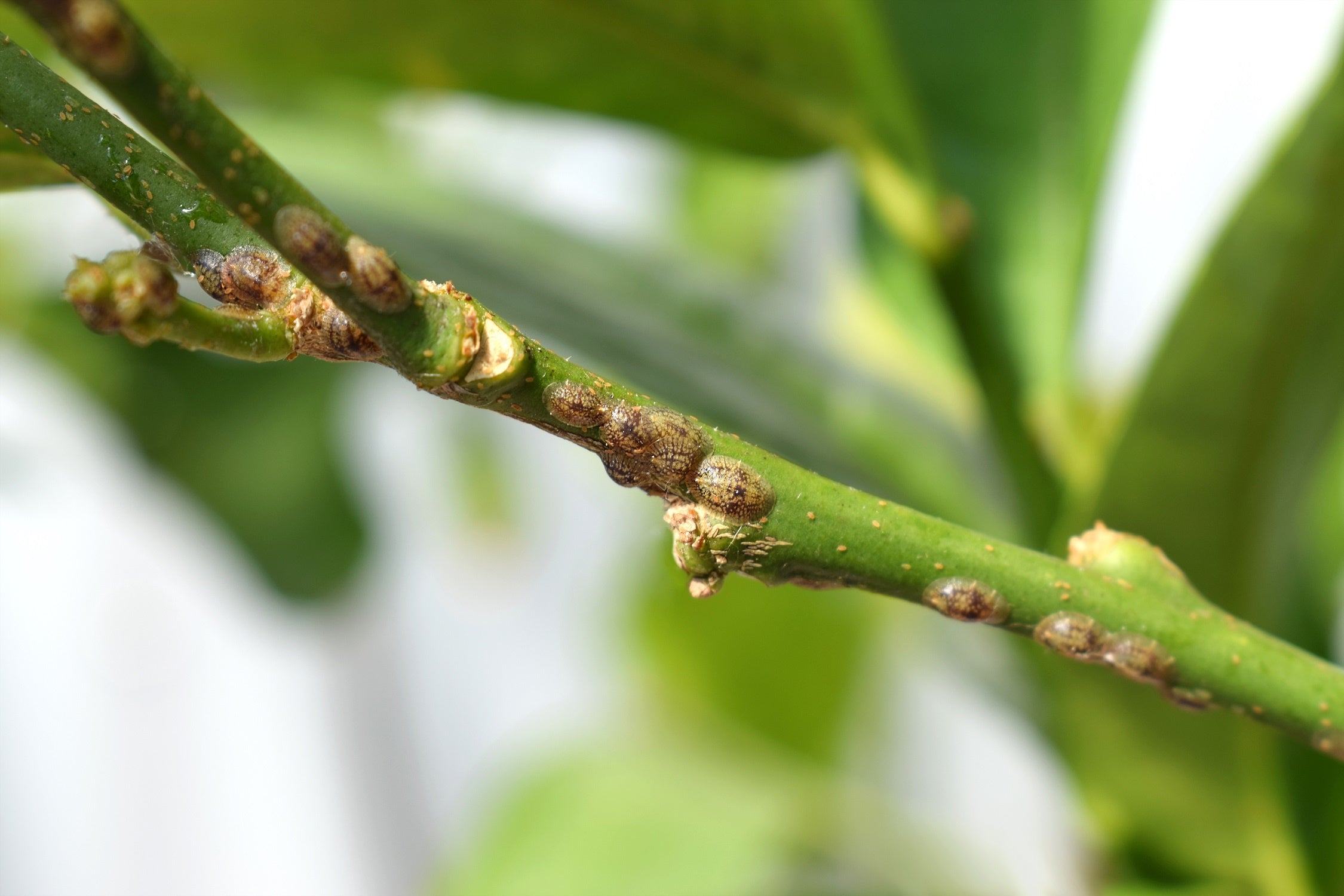When it comes to indoor gardens, there are a few different kinds of pests that are more common than the others. Let’s take a look at some of the most common pests.
- Mealybugs: If you see oval-shaped insects covered with white cotton-like growth and waxy covering on your plant, it is a mealybug for sure. Although they infect and ravage the entire plant, they are partial to new growth, leaf axels, along the underside of the leaves, and in between inter-crossing leaves and stems.
Physically remove the mealybugs with a cotton swab or cotton pad dipped in alcohol (sanitizer), or soap solution and then spray the plant with neem oil solution. Repeat this every few days for at least a week or two.

- Scale : Scales are a pretty common pest that appear along plant stems and sometimes leaves as hard bumps. The hard bumps are the external shells that protect the insects within. Adult scales are immobile and stick to the same spot and suck plant sap while the young ones travel to a spot and settle.
To get rid of scales, they need to be scraped off from the plant, but make sure to cover the soil to prevent the scales from falling into the soil. After you remove the scales, spray the plant with neem oil solution.

- Spider Mites : Spider mites are tiny insects that are usually red or yellow in colour. The most common sign of their infestation is silky webbing around tender new growth that leads to greying and bleaching of leaves along with irregular new growth.
Maintaining good humidity helps keep the spider mites away, they thrive in dry hot climate. To get rid of them, prune away heavily infected areas and spray with neem oil every 3-4 days till the mites go away.

- Fungus Gnat : Small insects buzzing around your plants are most probably fungus gnats. Extremely small and mostly black-grey in colour, they buzz around in growing season over moist soil with delicate wings. Fungus gnat larvae, however, feed on organic matter within the soil.
To get rid of these gnats, take care to let the topsoil dry before watering again to kill the larvae that thrive in moist soil. You can also use sticky traps or place a solution of ACV, water, and sugar in a bowl next to the plant to attract the gnats and make them drown.

- Thrips : Thrips are long insects that are either white or light green in colour with bristle like wings.
Thrips have piercing mouths with which they attach to plants and suck the plant sap out. Injured plant tissue acquire a silvery appearance that resembles leeching of chlorophyll. New plant growth comes disfigured.

Now after taking a look at the top 5 most common pests, lets take a look at the ways in which you can prevent any such infestation entirely.
- Good Sanitation
Maintaining a clean garden is the best way to keep your garden both disease and pest free. Clean u fallen leaves and plant parts, clean leaves with a wet rag regularly to keep dust and bug larvae away.
- Hand-Pick the Big Bugs
If you see any big bugs in your garden that is visible with naked eye, pick it up and throw it out of the garden before they lay eggs and multiply.
- Get rid of sick plants
There are times when one or two plants will be completely sick and pest infested, it is better to either quarantine them or get rid of them entirely.
- Use Natural Sprays
Use homemade all natural spray as the first line of defence. Soap water solution, ACV solution, and pepper solution spray are good options.
- Maintain good ventilation
Space out your plants to maintain good ventilation in between plants. It allows for air to flow freely and also keeps the pest from spreading from one plant to another.
- Keep Foliage Dry
When watering, it can be easy to get the foliage of your plants wet. Try to avoid it as an easy way to spread disease among your plants.
- Augment your Soil
A good healthy soil means better plant growth and stronger immune system. Use a well-draining potting mix that helps you avoid root rot and aeration through the soil helps improve root health.
- Weed out the troubles
Weeds not only add to the pest problem they also leech away essential nutrients from the soil. Remove the weeds before they take over the planter entirely and stop plant growth.
- Take a Cold Shower
Dousing your plants in cold water makes the pests fall of due to temperature shock and helps get rid of the pests.
- Soapy Water
Spraying your plant with soapy water takes away the waxy coating of the pests and makes them more susceptible to insecticidal solutions.
- Till the soil
Tilling the soil before plating will make sure that all soil pests run away. Adding need bark also helps.
- Water plants early in the morning.
Watering plants early in the morning means the foliage dries through the day and there is no excess moisture, it also means that plant has moisture available through the day for photosynthesis.
This is all you need to keep your plants happy.
Happy Gardening!








